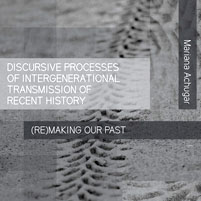Achugar Publishes Book on Remaking the Past

How do young citizens of a country with a painful past make sense of a history they weren’t present to witness? How are individual and collective memories associated with this past transmitted to younger generations? And how are these memories interpreted and used by a country’s youth to construct a national identity?
These questions form the basis of Mariana Achugar’s new book, “Discursive Processes of Intergenerational Transmission of Recent History: (Re)making Our Past.”
Achugar, associate professor of Hispanic Studies and second language acquisition, wanted to know how Uruguayan youth make sense of the Uruguayan Dictatorship of the 1970s and ’80s, and how the younger set uses semiotic materials available through interactions with older generations to construct identities as historical beings. She turned to family conversations, history textbooks, popular culture and other transmission tools to learn how information is being presented, received and used to understand the past while also giving shape to the present and future.
“This is a highly relevant and much needed book for scholars interested in memory and critical discourse studies,” said Teresa Oteíza of Pontificia Universidad Católica de Chile.
Ruth Wodak, emeritus distinguished professor of discourse studies at Lancaster University, added, “This is an excellent book – a must-read for scholars and students alike who want to understand the complex dynamics of memory, history, trauma, politics and discourse.”
Achugar received funding from the John Simon Guggenheim Memorial Foundation to conduct research for this book. It follows her 2008 release, “What We Remember: The construction of memory in military discourse.”